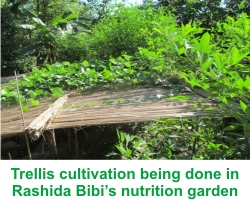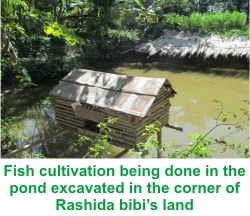|
Empowering Women through
Innovative
Murshidabad
district is one of the worst flood affected districts in the Ganges
basin in West Bengal and suffers from floods almost every year. The
homestead lands belonging to the subsistence farmers in this region
remain mostly unutilised throughout the year due to water inundation
during the rainy season and scarcity of water during the other seasons.
Due to changes in rainfall patterns and fluctuation of temperatures both
in the summer and winter months, the farmers face the problem of
increasing crop loss every year. Cultivation of vegetables is not a
usual practice here.
In such socio-economic conditions when these families are struggling to generate their basic minimum subsistence, twenty-one women farmers from Kalukhali village of Murshidabad have shown exemplary success in improving their income by applying new innovative farming techniques. These women farmers have an average landholding of less than half hectare mainly in the form of homestead lands. A local NGO by the name of Development Research Communication and Service Centre (DRCSC ) helped these women farmers prepare nutrition gardens in their homestead lands. They started growing drought-tolerant plants during summer and winter and water-tolerant crops during monsoon in their nutrition gardens using various water and soil conservation techniques and micro-irrigation methods like pitcher irrigation, raised and circle bed, mulching etc. and using fertilisers in the form of vermi-compost, cow-dung manure, compost from kitchen waste etc. Rashida bibi is a marginal farmer with a family size of 5 members having a homestead land holding of one third hectare, 5 ducks and 2 hens. She initiated the new agriculture practices by first digging a pond at the low-lying corner of her homestead land. On one end of the pond, a duck coop was constructed and fish cultivation started in the pond. The excreta of the ducks was utilised as fish feed. Used and wasted water of the family was drained into the pond.
The rest of the land
was leveled to develop an integrated farm for production of food, fodder
and fuel. Rashida bibi has grown crops of different lengths (long,
medium, short) in her 3-tier system that helps in reducing space. She
prepared four-inch-thick mulch bed for production of seasonal vegetables
like brinjal, turmeric, beans, okra, coriander, chilly, onion etc.
Temporary fencing was made with bamboo for protection from grazing
animals and plants like areca nut, mulberry, pigeon peas were planted
along the fence. The leaves and twigs of these trees were used as
fodder, fuel, for preparation of green manure and for construction of
trellis.
Rashida bibi did trellising in her garden for maximum utilisation of land and to save crops from water logged condition. Vegetables like bottle gourd, Indian spinach etc. were planted over the trellis while turmeric and other shade-tolerant crops were grown under the trellis. Rooftops were utilised for growing certain climbers. Sack cultivation technique was also used for growing vegetables on the roof top in which plants are grown in sacks or jute bags. This technique helps in moving these plants in case of any calamity like floods, storms etc occurs. Through the implementation of these integrated, climate change adaptation agriculture practices, she produces about 1kg 250 gm of vegetables every day. Her family gets nutrition from the vegetables along with animal proteins like fish and egg. This has not only reduced the cost of purchasing vegetables from the market but also fetches the family extra money by selling the excess vegetables in the market. She also supplements her family income by selling the fuel wood which she collects from the trees and plants she has grown for fencing her land. Rashida bibi has collected and preserved 9 different types of seeds for the next year. The family’s health condition has improved overall and she has become more empowered socially and economically. “I can now spend money for my family’s requirement and I have a say in the decision making in my family now” says Rashida Bibi.
Gitika Goswami
|

